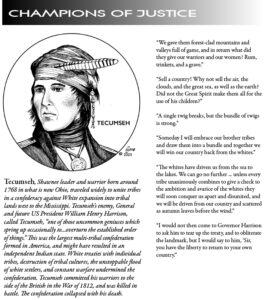 The far-right is on the march in America, attacking democracy and fundamental rights and making it more difficult for the world’s majority to live in peace and dignity.
The far-right is on the march in America, attacking democracy and fundamental rights and making it more difficult for the world’s majority to live in peace and dignity.
One year ago, the U.S. Supreme Court decided in Dobbs v. Jackson Women’s Health Organization to overturn Roe v Wade, which had guaranteed federal abortion rights, even though according to a Pew poll over 60 percent of Americans supported such rights. Other rulings have undermined environmental protections, separation of church and state, and gun regulations.
Now the court has lost even more credibility because of justices’ corruption. Clarence Thomas accepted hundreds of thousands of dollars’ worth of gifts and financial assistance from billionaire Howard Crow. Crow funds a rightwing group, CCI, that submitted briefs on eight varied cases before the court, and Thomas took Crow’s position on all of these. And similar reports have emerged about Samuel Alito.
All of this is another reason justifying the left’s longstanding call for democratizing or abolishing the Supreme Court.
The Supreme Court’s attack on rights and liberties from the top is accompanied by other attacks at all levels of American society. The Republicans have been undermining the right to vote through gerrymandering and exclusion of voters from the rolls, restricting trans rights, invading school and city libraries to ban books, and outlawing classroom discussions on race and gender issues. All the while, students, queer folks, land defenders, and reproductive rights activists have been fighting back at every turn.
In this issue, in our section on struggles in the United States, Dan Fischer discusses Cop City protests in Atlanta. Phil Gasper interviews Jesse Hagopian of the Zinn Education Project on the rightwing attack on education and the fight back. Shane Burley interviews anti-fascist activists. And Kevin Van Meter in “Searching for the American Worker” takes us back to the late 1940s and 1950s to look at how the leftwing Correspondence group attempted to understand workers’ experience in American industry.
We look at international left politics as well. James Buckwalter-Arias has organized a symposium of five articles on “Cuba’s Critical Left.” One of the authors, Alina Bárbara López Hernández, was detained on Wednesday, June 14, 2023, and remains under house arrest. We stand in solidarity with her and support her right of free expression. Also, José Laguarta discusses “The Puerto Rican Radical Tradition” through its many iterations. And Rohini Hensman interviews Kavita Krishnan, former head of the Communist Party of India (Marxist-Leninist) Liberation, on the party’s attitude to Russia’s war on Ukraine.
We are as always interested in new developments in capitalism and their critique, as well as discussions of the alternatives to it. So, in this issue we have Michael Albert examining the dangers of artificial intelligence, David Matthews writing on the mental health consequences of capitalism, and Robin Hahnel asking the question, “What do those who are fed up with capitalism propose to put in its place?” in an essay entitled “Beyond Capitalism: A Participatory Economy.”
We next turn to a Marxist classic. As part of a major project to collect and make available for the first time in English The Complete Works of Rosa Luxemburg, Peter Hudis and Sandra Rein have edited Volume IV, Political Writings 2, On Revolution (1906–1909). Robert Ovetz reviews the recently published volume and we reprint from it an excerpt from Nicholas Gray’s new translation of Luxemburg’s seminal essay, “The Mass Strike, the Political Party, and the Trade Unions.”
We have two review essays, one on labor and one on international affairs. Kim Moody’s review, “In Search of Worker Strategy: Seams, Chokepoints, and Organization,” discusses Labor Power and Strategy by John Womack Jr., edited by Peter Olney and Glenn Perušek. And Carl Mirra’s review essay examines the misleading and wrongheaded arguments in the influential War in Ukraine: Making Sense of a Senseless Conflict by Medea Benjamin and Nathaniel Davies.
In our culture section we have articles on music and film and some poems. Jonah Marvin’s “Unravelling ‘Arrythmia’” reviews Alexander Billet’s Shake the City: Experiments in Space and Time, Music and Crisis. Dan La Botz reviews the Netflix series “Transatlantic” about Marseilles in 1940-41 as Europeans fled Nazism. On the eightieth anniversary of the Warsaw Ghetto Uprising, we publish poems by Sam Friedman.
As always, we have several book reviews. Frances Fox Piven reviews Stephen Steinberg, Counterrevolution: The Crusade to Roll Back the Gains of the Civil Rights Movement. Promise Li reviews Gilbert Achcar’s analysis of The New Cold War. Guy Miller looks at Gordon Mantler’s examination of Harold Washington and the Democratic machine in Chicago. Dawn Paley and Brian Whitener discuss The Impasse of the Latin American Left by Franck Gaudichaud, Massimo Modonesi, and Jeffery R. Webber. And Betsy Zucker reviews Our Veterans: Winners, Losers, Friends, and Enemies on the New Terrain of Veterans Affairs by Suzanne Gordon, Steve Early, and Jasper Craven.
Just one more word. Our Champion of Justice for this issue is Tecumseh, the Shawnee chief who attempted to unite the American Indian tribes in order to stop the U.S. expansion and conquest of their territory. Some traditions claim that his mother was a Muscogee from the woodlands of Alabama and Georgia where the Cop City fight for the land is taking place today. Like the fighters of the Warsaw Ghetto Uprising, he defied the odds in mounting a fierce resistance against powerful and murderous imperialist forces. Similarly, the courageous people of Ukraine are confronting the criminal aggression of a far more powerful enemy; yet unlike the Warsaw Ghetto insurgents and the warriors of Tecumseh’s confederacy, they stand a chance of winning. It is to Ukraine’s just war against Russian aggression—and to all struggles for justice, from Cop City to reproductive rights—that we extend our solidarity and deepest hopes for victory.


Leave a Reply